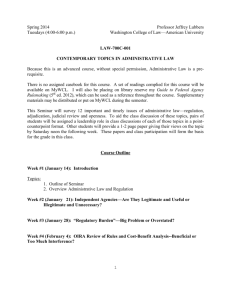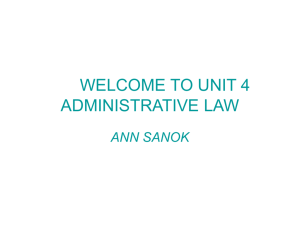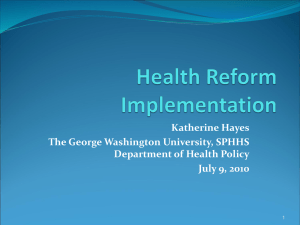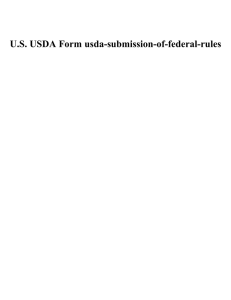Review Questions - Part II
advertisement
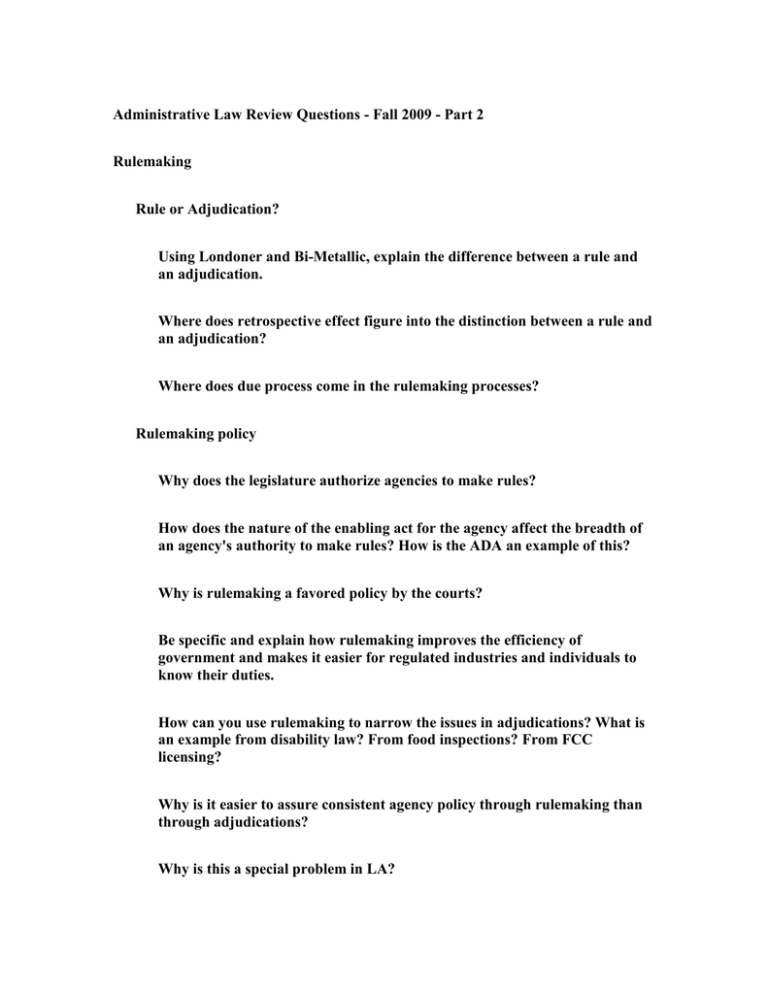
Administrative Law Review Questions - Fall 2009 - Part 2 Rulemaking Rule or Adjudication? Using Londoner and Bi-Metallic, explain the difference between a rule and an adjudication. Where does retrospective effect figure into the distinction between a rule and an adjudication? Where does due process come in the rulemaking processes? Rulemaking policy Why does the legislature authorize agencies to make rules? How does the nature of the enabling act for the agency affect the breadth of an agency's authority to make rules? How is the ADA an example of this? Why is rulemaking a favored policy by the courts? Be specific and explain how rulemaking improves the efficiency of government and makes it easier for regulated industries and individuals to know their duties. How can you use rulemaking to narrow the issues in adjudications? What is an example from disability law? From food inspections? From FCC licensing? Why is it easier to assure consistent agency policy through rulemaking than through adjudications? Why is this a special problem in LA? What is rulemaking ossification? What are the downsides of rulemaking and how can it undermine democracy? Legislative Rule or Interpretive Guidance? What is a legislative rule? What else are these called? What is the legal effect of a legislative rule that has been properly promulgated? What is a non-legislative/interpretive rule? What else are these called? What is the legal effect of an interpretive rule? What factors do the courts consider when determining whether an interpretive rule is really a legislative rule, requiring notice and comment? How does the "substantial impact" test differ from the "legally binding effect" test? What do the Hoctor and Picciotto cases tell us about the distinction between legislative and interpretive rules? What about the mine safety case? What is the result if an interpretative rule is inconsistent with a legislative rule? Why would an agency want to use an interpretive rule rather than a legislative rule? What is the risk to the agency if it used an interpretive rule and the court says it should have been a legislative rule? What is the benefit to the regulated parties of having interpretive rules? What is the downside of preventing agencies from using interpretive rules? Formal Rulemaking What is a formal rulemaking? When is it required? Why is it so disfavored by the courts? Informal (notice and comment) Rulemaking What are the requirements for notice and comment (informal) rulemaking? Can the record for a rule be supplemented when the rule is challenged in court? When can it be supplemented? What does Chamber of Commerce v. U.S. Dept. of Labor, 174 F.3d 206 (D.C. Cir. 1999) tells us about coercion and the determination of whether a voluntary policy is binding? What are the requirements for proving proper notice of the contents of a rule? Be specific, using Chocolate Manufacturers Ass'n v. Block as a example, and also explain the interplay between the agency's formal notice and the comments it receives. How was this modified by Arizona Public Service? When the agency relies on scientific evidence as the basis for a rule, what must be published in the register? Is the public entitled to the raw data behind the study the agency relies on? What is the significance of the Shelby Amendments? How does the notice provision in rulemaking change the issues in ex parte communications? How does the notice requirement eliminate the ex parte communications issues for communications before the promulgation of the rule? When are ex parte communications an issue in rulemaking? Discuss the limitations on ex parte communications and political influence in rulemaking, including how Sierra Club v. Costle modified the law from Volpe. What is the president's role in rulemaking? How are the problems of bias and prejudice different in rulemaking as opposed to adjudications? What is the standard for disqualifying the secretary for bias? What are the exemptions from rulemaking? Discuss rulemaking for emergency situations and what accommodations can be made to traditional notice and comment. Discuss waivers of rules, when they should be granted, and what political and due process problems they raise. Cost Benefit Analysis What is Justice Breyer's tunnel vision problem on regulations? Can CBA cure this? What is CBA? Why is CBA sometimes very controversial, especially for environmental regulations? What is PBA? What is the problem with lives saved analysis? Are they the same lives for different risks? What about disability? What are the most cost effective regulations? What type of risks do we spend the most on with the least return? What are examples? Why not prevent all possible risks? What is the precautionary principle and how does it relate to CBA? What are the tradeoffs in FDA regulation? What is drug lag? What is the regulatory policy expressed in Executive Order 12866? What is OIRA and what does it have to do with rulemaking? What is the Paperwork Reduction Act? Tort Law as Regulation How is tort law a regulatory process? Is it a democratic process? What is the public input? Who protects the public's interest in tort cases? Standing to Seek judicial Review and the Timing of Judicial Review Getting into court What is the general provision in the APA for getting into court when the agency does something against the law? What is case and controversy requirement? Can case and controversy be waived by Congress? What does it have to do with advisory opinions from federal courts? Do some states have a different standard for advisory opinions by the their courts? Standing What is standing? Is standing a constitutional or judicial doctrine? Discuss the components of standing: Injury, Causation, and Redressability. May congress give anyone standing to sue? Examples from the course? How does this satisfy Injury, Causation, and Redressability? What is the special problem with redressability for procedural injuries? What is the irreducible minimum for standing? Distinguish the injury in fact and zone of interest tests. Discuss the standing of federal agencies to contest the actions of other agencies. Why was the LA Legislature able to take away the power of the Insurance Commissioner to appeal ALJ decisions to the courts? Discuss tax payer standing in state and federal actions. Does congress have standing to sue to overturn its own laws? Associations and Third Parties When can associations sue on behalf of their members? Why is associational standing important to vindicate individual rights? What are the limits on the remedies in association standing cases? When can groups sue for third parties who are not members of their group? What is the problem with third party standing, as in Eastern Kentucky? Why did this case fail on redressability? Final agency action What is a final agency action? Why is final agency action required before you can go to court in most cases? What is the finality problem with reviewing non-legislative rules, i.e., guidelines, letter rulings, etc.? What do the courts look for to determine it an agency action is final? Examples? What do you have to show to claim a final agency action for documents like opinion letters? Give an example of when a letter ruling was found to be final action. Can you contest an opinion letter to a third party? What was the final agency action problem in the Standard Oil case? Why did Standard Oil care about the finding? Ripeness What is ripeness? Is ripeness a constitutional issue? What is a facial challenge to a regulation or agency policy? Why are facial challenges disfavored by the courts? Discuss pre-enforcement review, contrasting Abbott Labs with Toilet Products. What is the ripeness issue in these cases? Was the dispute ripe in National Automatic Laundry? How does pre-enforcement review help the beneficiaries of regulations? Why is getting an injunction critical to pre-enforcement review? What are the factors the court should consider in reviewing a request for an injunction in a pre-enforcement challenge case? Exhaustion of Remedies What is exhaustion of remedies? How do you know if exhaustion of remedies is an issue in a case? What are the exceptions to exhaustion of remedies? What is administrative issue exhaustion? When will the court waive it? What are the factors to balance in exhaustion cases? What is the futility doctrine and how do you satisfy it? When can exhaustion result in preclusion and what choice of remedies problem does this pose to counsel? Availability of Review What is statutory preclusion? What is collateral estoppel and non-acquiesce? When does the primary jurisdiction doctrine come up? How do the primary jurisdiction doctrine and exhaustion doctrine differ? What are the standards the court should use when deciding whether to defer to an agency in a primary jurisdiction case? What is the general rule on which actions are reviewed by district courts and which are reviewed by circuit courts? Discuss mandamus, including the standards for relief and when you would use it. Mass v. EPA What was the role of the petition for rule making in Mass. v. EPA? What is the agency required to do when it gets a petition requesting rulemaking? Why did EPA say it could not make a rule? Why did this invite judicial review? What might the agency have said that would have satisfied the court? What was the legal question before court? Why is this a global warming issue? What are the policy issues in requiring the EPA to make rules on greenhouse gasses, rather than allowing the agency to defer to congress? What was the evidence before the court that congress had considered global warming? How did this affect their analysis in the case? Scope of Judicial Review Basic issues What was the delegation doctrine issue during the New Deal? How does the "no law to apply" doctrine solve the constitutional problems of the delegation doctrine? What does the "no law to apply" doctrine mean in the context of review of discretionary agency actions? How does the size and expertise of federal agencies different from many state agencies, and how does this affect the discretion that the courts and legislatures grant to agencies? Do state courts defer more or less to agencies than federal courts? Think about Louisiana. Standards of review Define and distinguish these standards for review of agency findings of fact: Trial de novo; Independent judgment on the evidence; Clearly erroneous; Substantial evidence; Some evidence; and Facts not reviewable at all. What is standardless delegation and why does congress sometimes use it? How does standardless delegation affect Chevron review? How does standardless delegation relate to "no law to apply" and the refusal of the court to defer to the agency? What is the trade off between standards of review and agency flexibility? Agency interpretation of law How should the courts treat the agency's interpretation of what the law means? What is the Skidmore standard? What was the case about? What was the standard in NLRB v. Hearst Publications? How did the case differ from Skidmore? What were the facts of Chevron U.S.A., Inc. v. Natural Resources Defense Council and how is the resolution in Chevron an example of the Chevron two step? How do you distinguish Mead from Chevron? Can you explain these cases in terms of the level of formality of agency process, i.e., Chevron was a notice and comment rule, Mead was a letter ruling. What are the Barnhart Factors for evaluating agency persuasiveness? Does this take us back to Skidmore? What factors should indicate to a reviewing court that an agency interpretation of law is probably correct? What is legislative history and how can it be manipulated? Be prepared to explain the Chevron steps and analysis in FDA v. Brown & Williamson Tobacco Corp., 529 U.S. 120 (U.S. 2000). How was the law ambiguous in Brown & Williamson? How was legislative history used in Brown & Williamson? What was the regulatory conflict problem in Brown & Williamson? What was Breyer's solution to the regulatory conflict in Brown & Williamson? Judicial Review of Regulations How did Citizens to Preserve Overton Park v. Volpe, 401 U.S. 402 (1971) change the understanding of committed to agency discretion? What is hard look review? How is hard look review reconciled with deference to agency decisionmaking? What are the pros and cons of hard and soft look review? Explain why Motor Vehicles Manufacturers Assoc. v State Farm is important in regard to the judicial review of regulations. What does the Seatbelt Saga teach us? What are the ways to attack regulations if they are not being enforced against your client and the initial statutory review period has passed? When can you claim equitable estoppel for relying on agency advice? When is it not available? Can you get damages from the agency for bad advice? Why is equitable estoppel valuable? Administrative Information Collection How do agencies gather information? What is the difference between a first party subpoena and a third party subpoena? When does an individual retain some rights against a third party subpoena? What are examples of situations where an individual does not have rights against a third party subpoena? What are transaction documents and why are they easy to get with administrative subpoenas? What are the due process rights for administrative subpoenas and how do these differ from criminal law due process rights? When does self-incrimination apply to documents? How might this cause problems in a Medicare billing investigation where the agency is investigating for civil penalties and DOJ wants to prosecute? When does self-incrimination apply in administrative proceeding? How can you cure the problem? Why don't administrative searches violate the 4th amendment? How did the See and Camara Courts modify the Frank Court's rule on warrants for administrative searches? What are area warrants used for, why are they required, and how do they differ from criminal law warrants? What are the Burger factors for deciding if a business is pervasively regulated? How do warrant requirements differ for these businesses? What is the rationale for why warrants are not necessary for pervasively regulated businesses? Why was criminal prosecution allowed for evidence obtained in an administrative search in Burger? How can licensing and permits meet the Burger factors and allow warrantless searches? What are the issues when an administrative search, such as a restaurant inspection, turns up evidence of an unrelated crime - say the health inspector finds the cook's cocaine stash? FOIA What is the policy behind FOIA? What is the standard for judicial review of denials of FOIA requests? When will the court defer to the agency in the review of FOIA requests? How is FOIA different from discovery? Why would you use FOIA instead of discovery? What does it mean to say that FOIA is about access to records and not to information? How is this changing in the electronic world? How do you request documents under the FOIA? What is a Glomar response and why is it necessary? What is reverse FOIA? (Chrysler case) What does Ex. Order 12600 require? Why is this critical to reverse FOIA protections? What is the privacy act and what does it allow you to do? What are Sunshine Acts? What is a meeting under a Sunshine Act and why is the definition important? How do Moberg and FCC v. ITT differ in their definitions of meetings? How do agencies try to get around Sunshine acts? What are the basic provisions of the Federal Advisory Committee Act (FACA)? How does the FACA potentially violate separation of powers? End
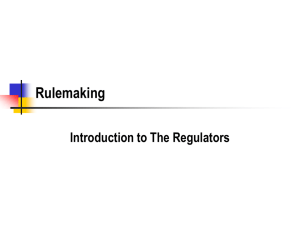
![Minnesota Department of [Name] MEMORANDUM](http://s2.studylib.net/store/data/015049440_1-475d22d0ab7bd661c71329dec0ae8429-300x300.png)
